Organisational Behaviour Report: Barclays PLC, Unit 12 Analysis
VerifiedAdded on 2022/12/28
|19
|5574
|74
Report
AI Summary
This report offers a comprehensive analysis of organisational behaviour, focusing on the influence of culture, power, and politics on individual and team performance within Barclays PLC. It delves into various motivational theories, including content and process theories such as Maslow's hierarchy of needs, Herzberg's two-factor theory, and Vroom's expectancy theory, evaluating their practical applications. Furthermore, the report examines the key factors that distinguish effective teams from ineffective ones, providing insights into team dynamics and management strategies. Finally, it explores different organisational behaviour philosophies and concepts, offering a holistic understanding of workplace dynamics and strategies for enhancing employee productivity and satisfaction. The report aims to provide a critical understanding of organisational behaviour principles, offering practical insights for business management and leadership.
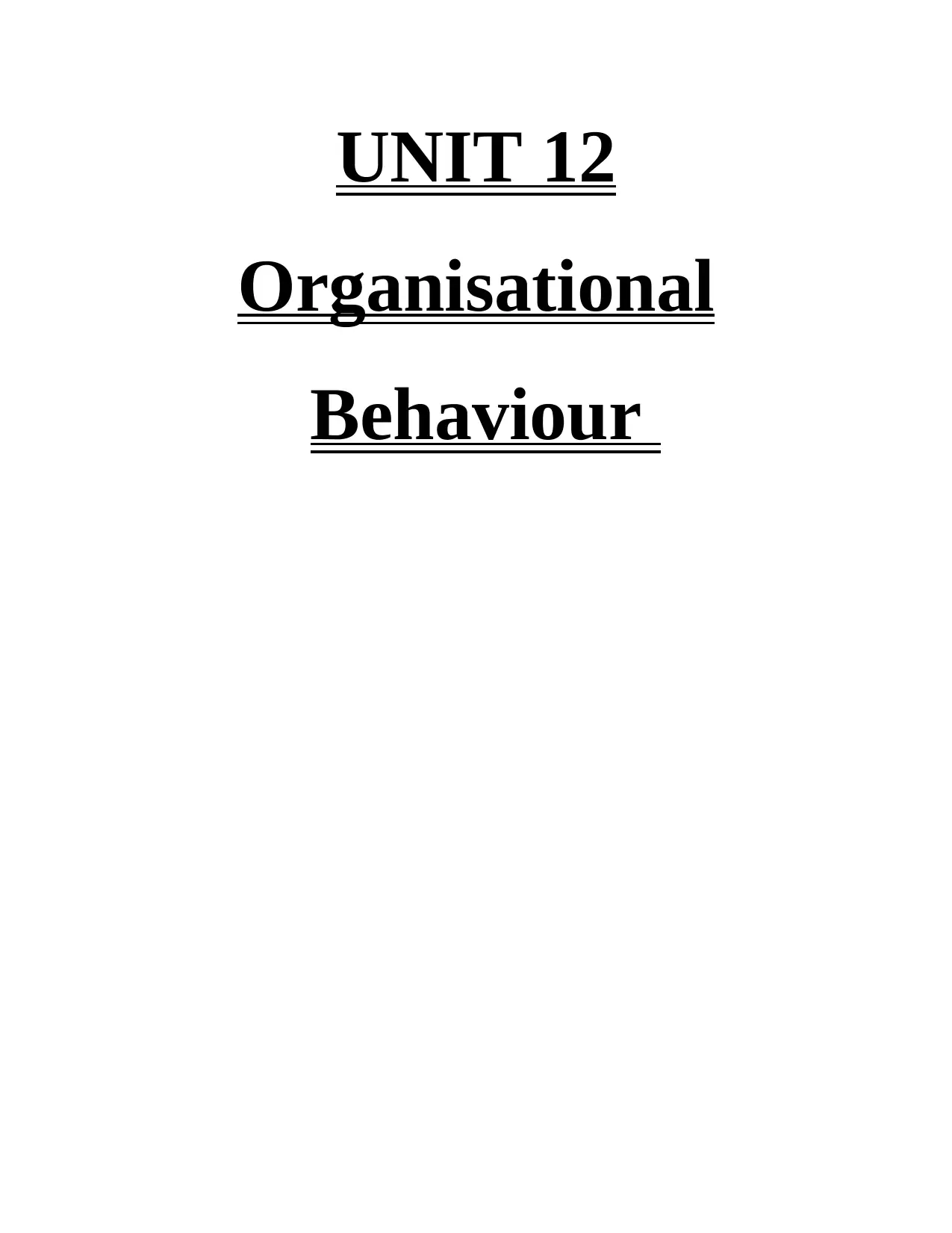
UNIT 12
Organisational
Behaviour
Organisational
Behaviour
Paraphrase This Document
Need a fresh take? Get an instant paraphrase of this document with our AI Paraphraser
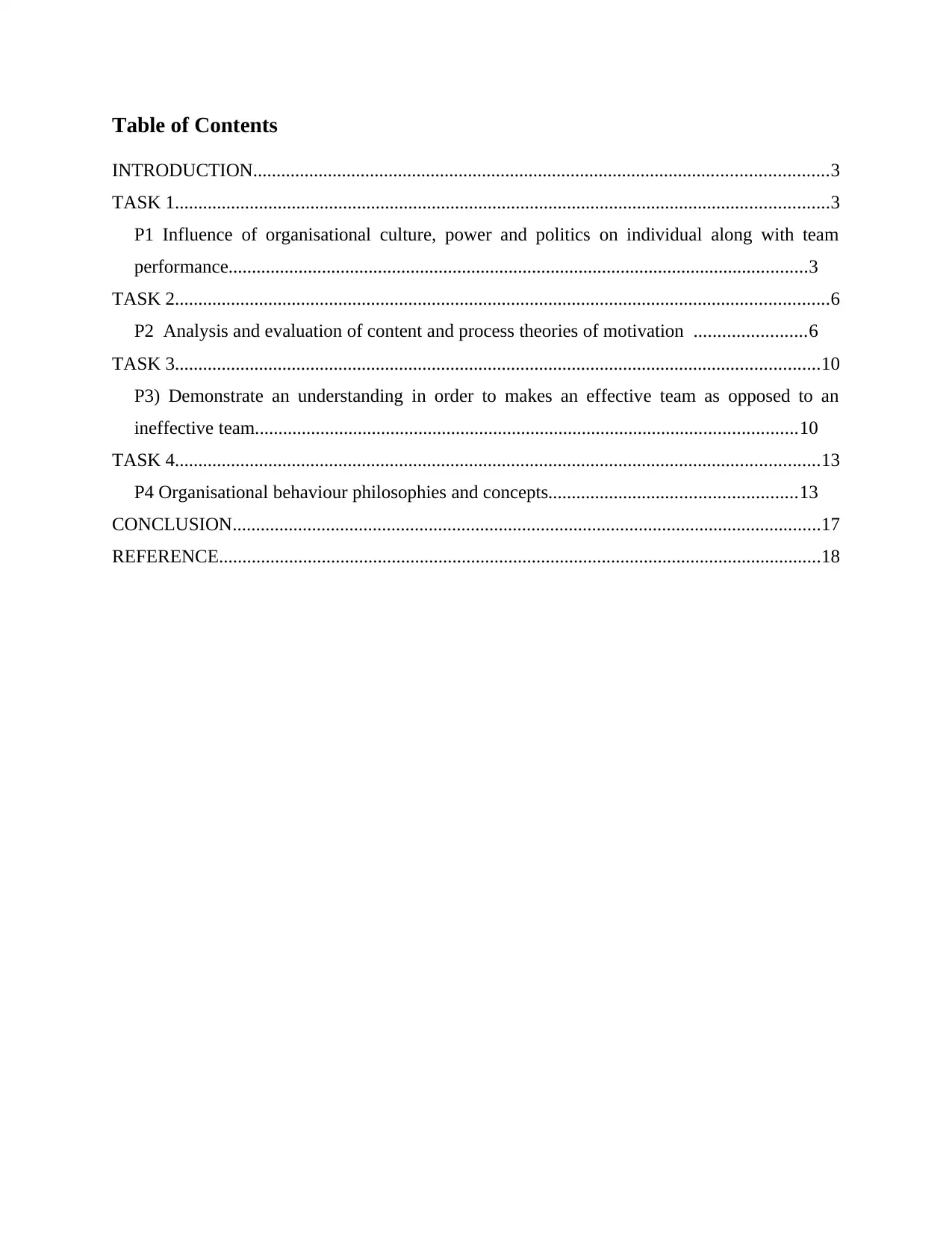
Table of Contents
INTRODUCTION...........................................................................................................................3
TASK 1............................................................................................................................................3
P1 Influence of organisational culture, power and politics on individual along with team
performance............................................................................................................................3
TASK 2............................................................................................................................................6
P2 Analysis and evaluation of content and process theories of motivation ........................6
TASK 3..........................................................................................................................................10
P3) Demonstrate an understanding in order to makes an effective team as opposed to an
ineffective team....................................................................................................................10
TASK 4..........................................................................................................................................13
P4 Organisational behaviour philosophies and concepts.....................................................13
CONCLUSION..............................................................................................................................17
REFERENCE.................................................................................................................................18
INTRODUCTION...........................................................................................................................3
TASK 1............................................................................................................................................3
P1 Influence of organisational culture, power and politics on individual along with team
performance............................................................................................................................3
TASK 2............................................................................................................................................6
P2 Analysis and evaluation of content and process theories of motivation ........................6
TASK 3..........................................................................................................................................10
P3) Demonstrate an understanding in order to makes an effective team as opposed to an
ineffective team....................................................................................................................10
TASK 4..........................................................................................................................................13
P4 Organisational behaviour philosophies and concepts.....................................................13
CONCLUSION..............................................................................................................................17
REFERENCE.................................................................................................................................18
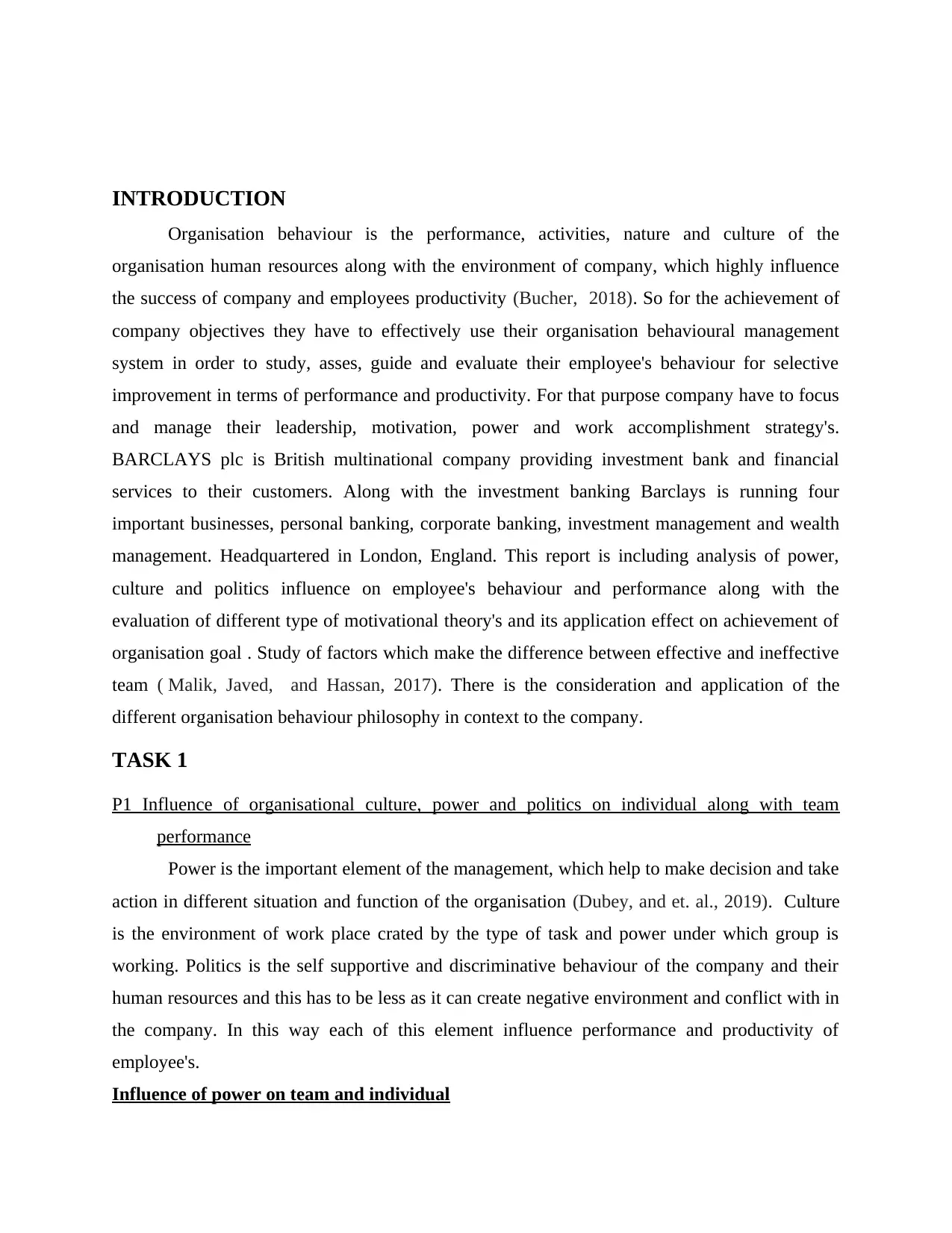
INTRODUCTION
Organisation behaviour is the performance, activities, nature and culture of the
organisation human resources along with the environment of company, which highly influence
the success of company and employees productivity (Bucher, 2018). So for the achievement of
company objectives they have to effectively use their organisation behavioural management
system in order to study, asses, guide and evaluate their employee's behaviour for selective
improvement in terms of performance and productivity. For that purpose company have to focus
and manage their leadership, motivation, power and work accomplishment strategy's.
BARCLAYS plc is British multinational company providing investment bank and financial
services to their customers. Along with the investment banking Barclays is running four
important businesses, personal banking, corporate banking, investment management and wealth
management. Headquartered in London, England. This report is including analysis of power,
culture and politics influence on employee's behaviour and performance along with the
evaluation of different type of motivational theory's and its application effect on achievement of
organisation goal . Study of factors which make the difference between effective and ineffective
team ( Malik, Javed, and Hassan, 2017). There is the consideration and application of the
different organisation behaviour philosophy in context to the company.
TASK 1
P1 Influence of organisational culture, power and politics on individual along with team
performance
Power is the important element of the management, which help to make decision and take
action in different situation and function of the organisation (Dubey, and et. al., 2019). Culture
is the environment of work place crated by the type of task and power under which group is
working. Politics is the self supportive and discriminative behaviour of the company and their
human resources and this has to be less as it can create negative environment and conflict with in
the company. In this way each of this element influence performance and productivity of
employee's.
Influence of power on team and individual
Organisation behaviour is the performance, activities, nature and culture of the
organisation human resources along with the environment of company, which highly influence
the success of company and employees productivity (Bucher, 2018). So for the achievement of
company objectives they have to effectively use their organisation behavioural management
system in order to study, asses, guide and evaluate their employee's behaviour for selective
improvement in terms of performance and productivity. For that purpose company have to focus
and manage their leadership, motivation, power and work accomplishment strategy's.
BARCLAYS plc is British multinational company providing investment bank and financial
services to their customers. Along with the investment banking Barclays is running four
important businesses, personal banking, corporate banking, investment management and wealth
management. Headquartered in London, England. This report is including analysis of power,
culture and politics influence on employee's behaviour and performance along with the
evaluation of different type of motivational theory's and its application effect on achievement of
organisation goal . Study of factors which make the difference between effective and ineffective
team ( Malik, Javed, and Hassan, 2017). There is the consideration and application of the
different organisation behaviour philosophy in context to the company.
TASK 1
P1 Influence of organisational culture, power and politics on individual along with team
performance
Power is the important element of the management, which help to make decision and take
action in different situation and function of the organisation (Dubey, and et. al., 2019). Culture
is the environment of work place crated by the type of task and power under which group is
working. Politics is the self supportive and discriminative behaviour of the company and their
human resources and this has to be less as it can create negative environment and conflict with in
the company. In this way each of this element influence performance and productivity of
employee's.
Influence of power on team and individual
⊘ This is a preview!⊘
Do you want full access?
Subscribe today to unlock all pages.

Trusted by 1+ million students worldwide
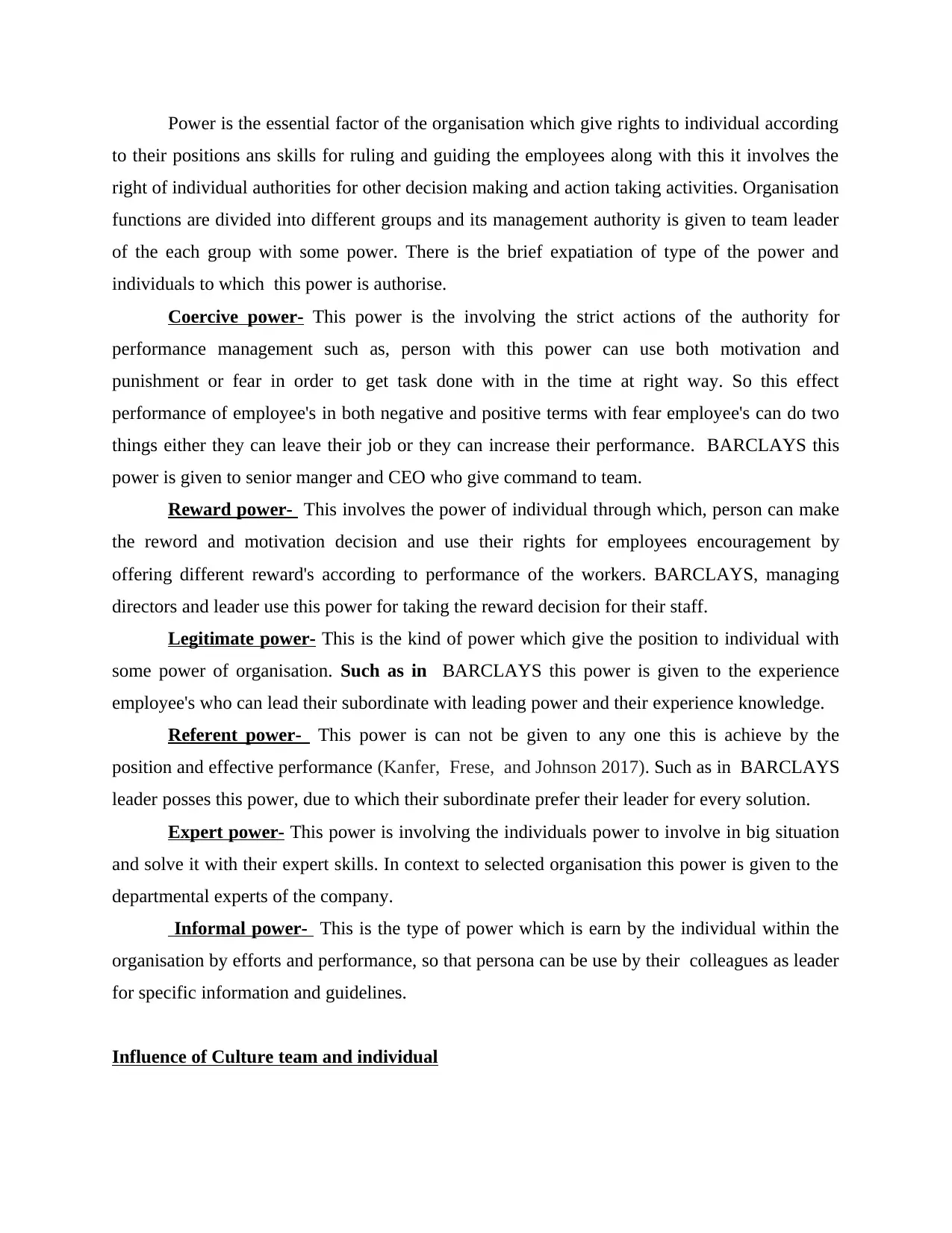
Power is the essential factor of the organisation which give rights to individual according
to their positions ans skills for ruling and guiding the employees along with this it involves the
right of individual authorities for other decision making and action taking activities. Organisation
functions are divided into different groups and its management authority is given to team leader
of the each group with some power. There is the brief expatiation of type of the power and
individuals to which this power is authorise.
Coercive power- This power is the involving the strict actions of the authority for
performance management such as, person with this power can use both motivation and
punishment or fear in order to get task done with in the time at right way. So this effect
performance of employee's in both negative and positive terms with fear employee's can do two
things either they can leave their job or they can increase their performance. BARCLAYS this
power is given to senior manger and CEO who give command to team.
Reward power- This involves the power of individual through which, person can make
the reword and motivation decision and use their rights for employees encouragement by
offering different reward's according to performance of the workers. BARCLAYS, managing
directors and leader use this power for taking the reward decision for their staff.
Legitimate power- This is the kind of power which give the position to individual with
some power of organisation. Such as in BARCLAYS this power is given to the experience
employee's who can lead their subordinate with leading power and their experience knowledge.
Referent power- This power is can not be given to any one this is achieve by the
position and effective performance (Kanfer, Frese, and Johnson 2017). Such as in BARCLAYS
leader posses this power, due to which their subordinate prefer their leader for every solution.
Expert power- This power is involving the individuals power to involve in big situation
and solve it with their expert skills. In context to selected organisation this power is given to the
departmental experts of the company.
Informal power- This is the type of power which is earn by the individual within the
organisation by efforts and performance, so that persona can be use by their colleagues as leader
for specific information and guidelines.
Influence of Culture team and individual
to their positions ans skills for ruling and guiding the employees along with this it involves the
right of individual authorities for other decision making and action taking activities. Organisation
functions are divided into different groups and its management authority is given to team leader
of the each group with some power. There is the brief expatiation of type of the power and
individuals to which this power is authorise.
Coercive power- This power is the involving the strict actions of the authority for
performance management such as, person with this power can use both motivation and
punishment or fear in order to get task done with in the time at right way. So this effect
performance of employee's in both negative and positive terms with fear employee's can do two
things either they can leave their job or they can increase their performance. BARCLAYS this
power is given to senior manger and CEO who give command to team.
Reward power- This involves the power of individual through which, person can make
the reword and motivation decision and use their rights for employees encouragement by
offering different reward's according to performance of the workers. BARCLAYS, managing
directors and leader use this power for taking the reward decision for their staff.
Legitimate power- This is the kind of power which give the position to individual with
some power of organisation. Such as in BARCLAYS this power is given to the experience
employee's who can lead their subordinate with leading power and their experience knowledge.
Referent power- This power is can not be given to any one this is achieve by the
position and effective performance (Kanfer, Frese, and Johnson 2017). Such as in BARCLAYS
leader posses this power, due to which their subordinate prefer their leader for every solution.
Expert power- This power is involving the individuals power to involve in big situation
and solve it with their expert skills. In context to selected organisation this power is given to the
departmental experts of the company.
Informal power- This is the type of power which is earn by the individual within the
organisation by efforts and performance, so that persona can be use by their colleagues as leader
for specific information and guidelines.
Influence of Culture team and individual
Paraphrase This Document
Need a fresh take? Get an instant paraphrase of this document with our AI Paraphraser
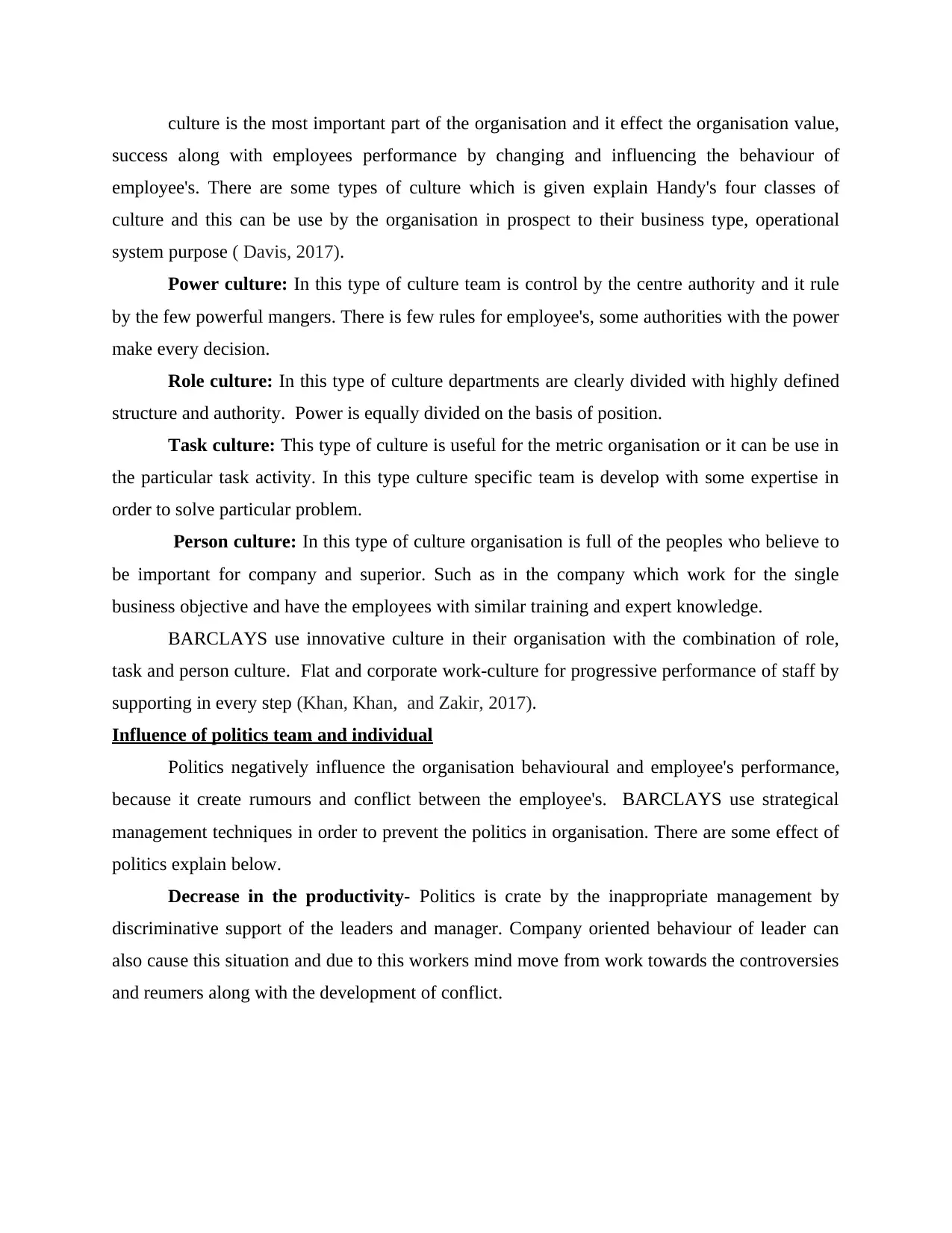
culture is the most important part of the organisation and it effect the organisation value,
success along with employees performance by changing and influencing the behaviour of
employee's. There are some types of culture which is given explain Handy's four classes of
culture and this can be use by the organisation in prospect to their business type, operational
system purpose ( Davis, 2017).
Power culture: In this type of culture team is control by the centre authority and it rule
by the few powerful mangers. There is few rules for employee's, some authorities with the power
make every decision.
Role culture: In this type of culture departments are clearly divided with highly defined
structure and authority. Power is equally divided on the basis of position.
Task culture: This type of culture is useful for the metric organisation or it can be use in
the particular task activity. In this type culture specific team is develop with some expertise in
order to solve particular problem.
Person culture: In this type of culture organisation is full of the peoples who believe to
be important for company and superior. Such as in the company which work for the single
business objective and have the employees with similar training and expert knowledge.
BARCLAYS use innovative culture in their organisation with the combination of role,
task and person culture. Flat and corporate work-culture for progressive performance of staff by
supporting in every step (Khan, Khan, and Zakir, 2017).
Influence of politics team and individual
Politics negatively influence the organisation behavioural and employee's performance,
because it create rumours and conflict between the employee's. BARCLAYS use strategical
management techniques in order to prevent the politics in organisation. There are some effect of
politics explain below.
Decrease in the productivity- Politics is crate by the inappropriate management by
discriminative support of the leaders and manager. Company oriented behaviour of leader can
also cause this situation and due to this workers mind move from work towards the controversies
and reumers along with the development of conflict.
success along with employees performance by changing and influencing the behaviour of
employee's. There are some types of culture which is given explain Handy's four classes of
culture and this can be use by the organisation in prospect to their business type, operational
system purpose ( Davis, 2017).
Power culture: In this type of culture team is control by the centre authority and it rule
by the few powerful mangers. There is few rules for employee's, some authorities with the power
make every decision.
Role culture: In this type of culture departments are clearly divided with highly defined
structure and authority. Power is equally divided on the basis of position.
Task culture: This type of culture is useful for the metric organisation or it can be use in
the particular task activity. In this type culture specific team is develop with some expertise in
order to solve particular problem.
Person culture: In this type of culture organisation is full of the peoples who believe to
be important for company and superior. Such as in the company which work for the single
business objective and have the employees with similar training and expert knowledge.
BARCLAYS use innovative culture in their organisation with the combination of role,
task and person culture. Flat and corporate work-culture for progressive performance of staff by
supporting in every step (Khan, Khan, and Zakir, 2017).
Influence of politics team and individual
Politics negatively influence the organisation behavioural and employee's performance,
because it create rumours and conflict between the employee's. BARCLAYS use strategical
management techniques in order to prevent the politics in organisation. There are some effect of
politics explain below.
Decrease in the productivity- Politics is crate by the inappropriate management by
discriminative support of the leaders and manager. Company oriented behaviour of leader can
also cause this situation and due to this workers mind move from work towards the controversies
and reumers along with the development of conflict.
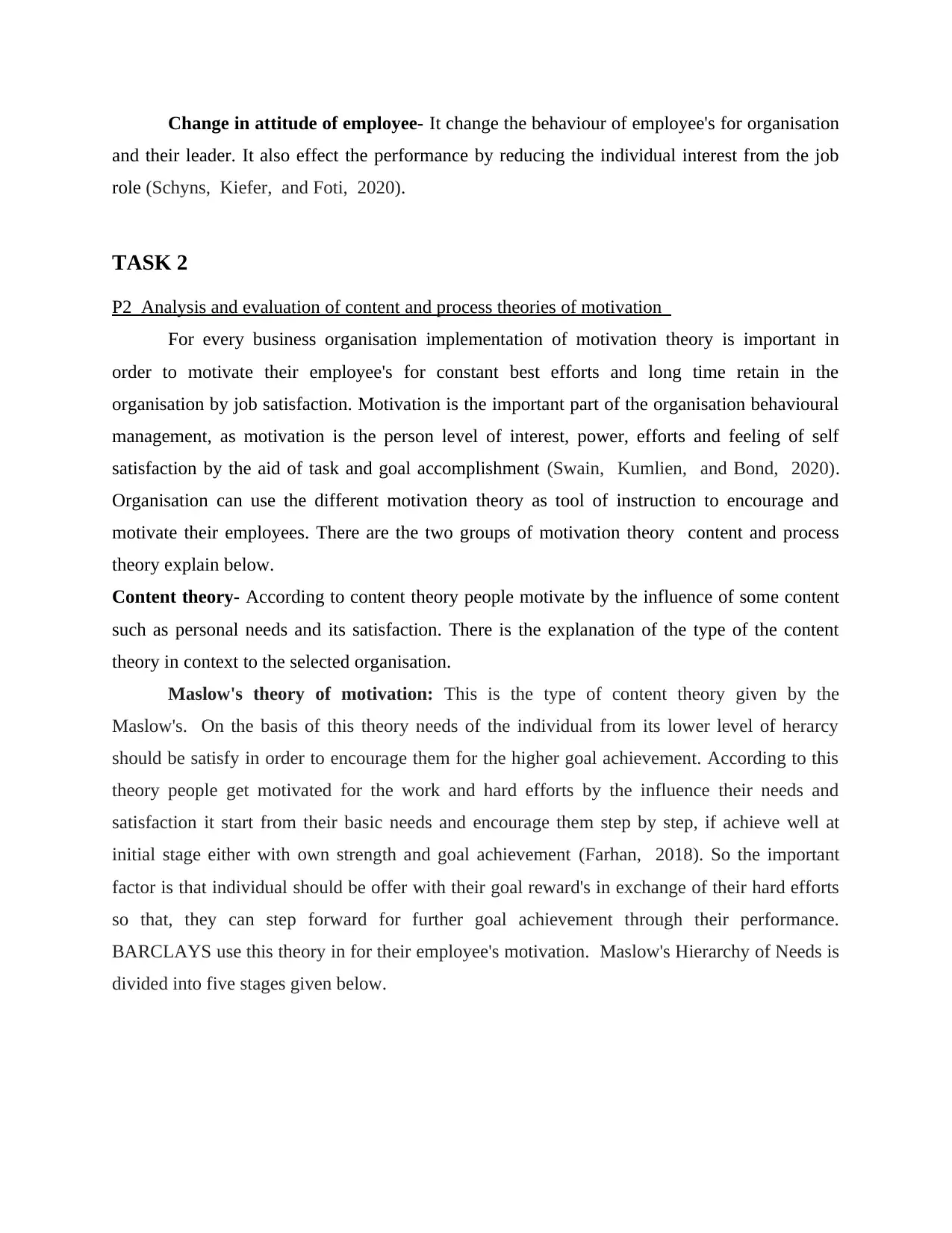
Change in attitude of employee- It change the behaviour of employee's for organisation
and their leader. It also effect the performance by reducing the individual interest from the job
role (Schyns, Kiefer, and Foti, 2020).
TASK 2
P2 Analysis and evaluation of content and process theories of motivation
For every business organisation implementation of motivation theory is important in
order to motivate their employee's for constant best efforts and long time retain in the
organisation by job satisfaction. Motivation is the important part of the organisation behavioural
management, as motivation is the person level of interest, power, efforts and feeling of self
satisfaction by the aid of task and goal accomplishment (Swain, Kumlien, and Bond, 2020).
Organisation can use the different motivation theory as tool of instruction to encourage and
motivate their employees. There are the two groups of motivation theory content and process
theory explain below.
Content theory- According to content theory people motivate by the influence of some content
such as personal needs and its satisfaction. There is the explanation of the type of the content
theory in context to the selected organisation.
Maslow's theory of motivation: This is the type of content theory given by the
Maslow's. On the basis of this theory needs of the individual from its lower level of herarcy
should be satisfy in order to encourage them for the higher goal achievement. According to this
theory people get motivated for the work and hard efforts by the influence their needs and
satisfaction it start from their basic needs and encourage them step by step, if achieve well at
initial stage either with own strength and goal achievement (Farhan, 2018). So the important
factor is that individual should be offer with their goal reward's in exchange of their hard efforts
so that, they can step forward for further goal achievement through their performance.
BARCLAYS use this theory in for their employee's motivation. Maslow's Hierarchy of Needs is
divided into five stages given below.
and their leader. It also effect the performance by reducing the individual interest from the job
role (Schyns, Kiefer, and Foti, 2020).
TASK 2
P2 Analysis and evaluation of content and process theories of motivation
For every business organisation implementation of motivation theory is important in
order to motivate their employee's for constant best efforts and long time retain in the
organisation by job satisfaction. Motivation is the important part of the organisation behavioural
management, as motivation is the person level of interest, power, efforts and feeling of self
satisfaction by the aid of task and goal accomplishment (Swain, Kumlien, and Bond, 2020).
Organisation can use the different motivation theory as tool of instruction to encourage and
motivate their employees. There are the two groups of motivation theory content and process
theory explain below.
Content theory- According to content theory people motivate by the influence of some content
such as personal needs and its satisfaction. There is the explanation of the type of the content
theory in context to the selected organisation.
Maslow's theory of motivation: This is the type of content theory given by the
Maslow's. On the basis of this theory needs of the individual from its lower level of herarcy
should be satisfy in order to encourage them for the higher goal achievement. According to this
theory people get motivated for the work and hard efforts by the influence their needs and
satisfaction it start from their basic needs and encourage them step by step, if achieve well at
initial stage either with own strength and goal achievement (Farhan, 2018). So the important
factor is that individual should be offer with their goal reward's in exchange of their hard efforts
so that, they can step forward for further goal achievement through their performance.
BARCLAYS use this theory in for their employee's motivation. Maslow's Hierarchy of Needs is
divided into five stages given below.
⊘ This is a preview!⊘
Do you want full access?
Subscribe today to unlock all pages.

Trusted by 1+ million students worldwide
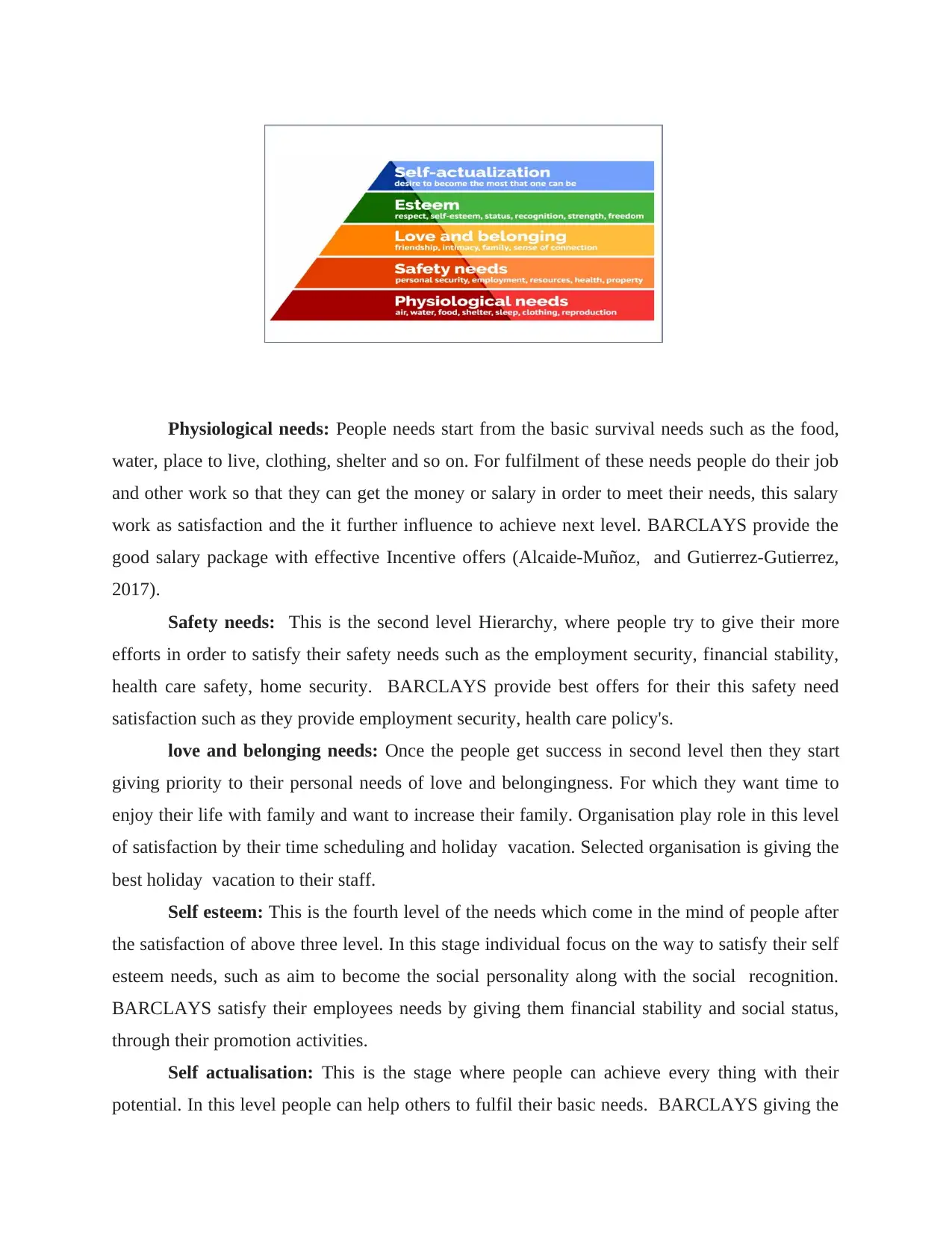
Physiological needs: People needs start from the basic survival needs such as the food,
water, place to live, clothing, shelter and so on. For fulfilment of these needs people do their job
and other work so that they can get the money or salary in order to meet their needs, this salary
work as satisfaction and the it further influence to achieve next level. BARCLAYS provide the
good salary package with effective Incentive offers (Alcaide-Muñoz, and Gutierrez-Gutierrez,
2017).
Safety needs: This is the second level Hierarchy, where people try to give their more
efforts in order to satisfy their safety needs such as the employment security, financial stability,
health care safety, home security. BARCLAYS provide best offers for their this safety need
satisfaction such as they provide employment security, health care policy's.
love and belonging needs: Once the people get success in second level then they start
giving priority to their personal needs of love and belongingness. For which they want time to
enjoy their life with family and want to increase their family. Organisation play role in this level
of satisfaction by their time scheduling and holiday vacation. Selected organisation is giving the
best holiday vacation to their staff.
Self esteem: This is the fourth level of the needs which come in the mind of people after
the satisfaction of above three level. In this stage individual focus on the way to satisfy their self
esteem needs, such as aim to become the social personality along with the social recognition.
BARCLAYS satisfy their employees needs by giving them financial stability and social status,
through their promotion activities.
Self actualisation: This is the stage where people can achieve every thing with their
potential. In this level people can help others to fulfil their basic needs. BARCLAYS giving the
water, place to live, clothing, shelter and so on. For fulfilment of these needs people do their job
and other work so that they can get the money or salary in order to meet their needs, this salary
work as satisfaction and the it further influence to achieve next level. BARCLAYS provide the
good salary package with effective Incentive offers (Alcaide-Muñoz, and Gutierrez-Gutierrez,
2017).
Safety needs: This is the second level Hierarchy, where people try to give their more
efforts in order to satisfy their safety needs such as the employment security, financial stability,
health care safety, home security. BARCLAYS provide best offers for their this safety need
satisfaction such as they provide employment security, health care policy's.
love and belonging needs: Once the people get success in second level then they start
giving priority to their personal needs of love and belongingness. For which they want time to
enjoy their life with family and want to increase their family. Organisation play role in this level
of satisfaction by their time scheduling and holiday vacation. Selected organisation is giving the
best holiday vacation to their staff.
Self esteem: This is the fourth level of the needs which come in the mind of people after
the satisfaction of above three level. In this stage individual focus on the way to satisfy their self
esteem needs, such as aim to become the social personality along with the social recognition.
BARCLAYS satisfy their employees needs by giving them financial stability and social status,
through their promotion activities.
Self actualisation: This is the stage where people can achieve every thing with their
potential. In this level people can help others to fulfil their basic needs. BARCLAYS giving the
Paraphrase This Document
Need a fresh take? Get an instant paraphrase of this document with our AI Paraphraser
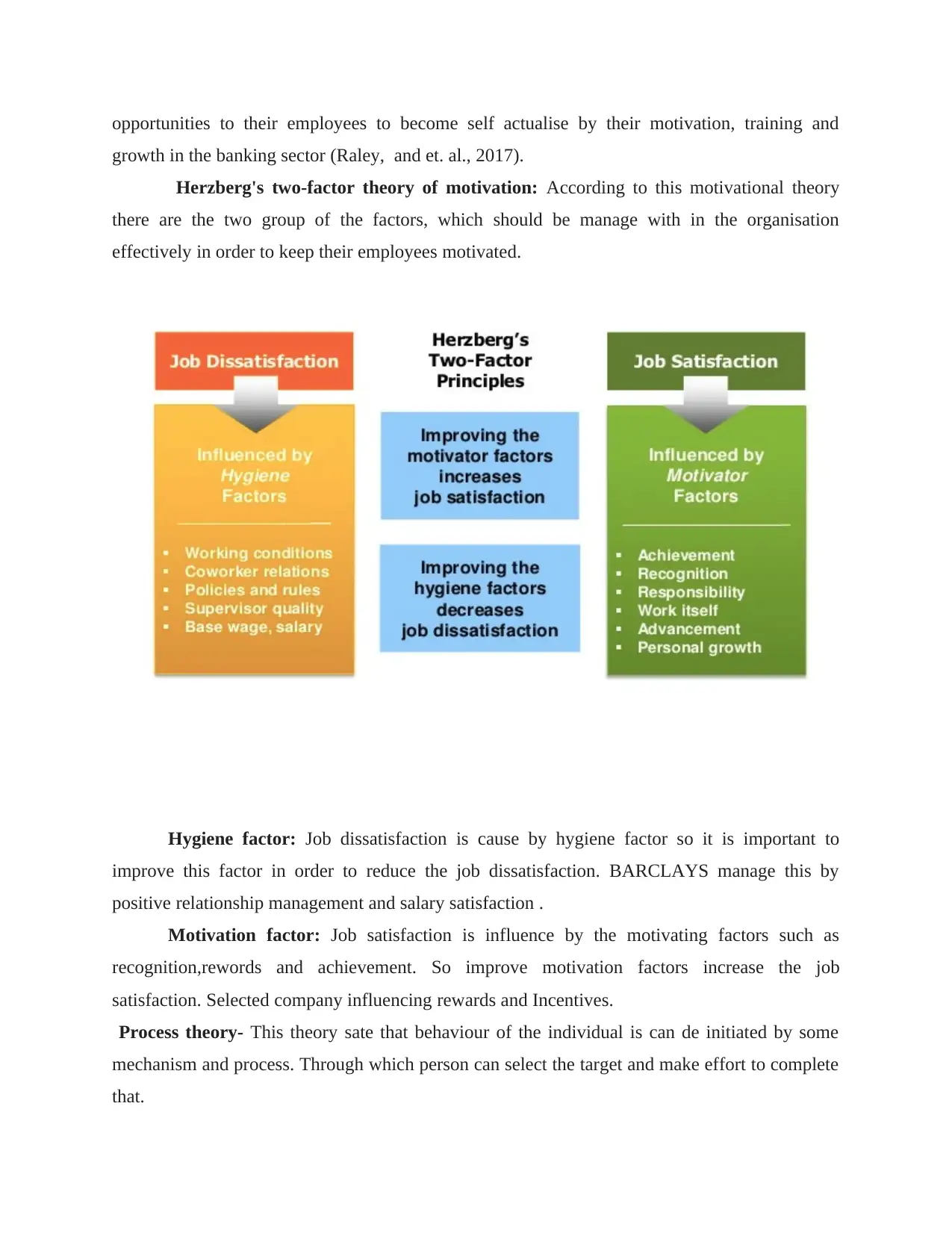
opportunities to their employees to become self actualise by their motivation, training and
growth in the banking sector (Raley, and et. al., 2017).
Herzberg's two-factor theory of motivation: According to this motivational theory
there are the two group of the factors, which should be manage with in the organisation
effectively in order to keep their employees motivated.
Hygiene factor: Job dissatisfaction is cause by hygiene factor so it is important to
improve this factor in order to reduce the job dissatisfaction. BARCLAYS manage this by
positive relationship management and salary satisfaction .
Motivation factor: Job satisfaction is influence by the motivating factors such as
recognition,rewords and achievement. So improve motivation factors increase the job
satisfaction. Selected company influencing rewards and Incentives.
Process theory- This theory sate that behaviour of the individual is can de initiated by some
mechanism and process. Through which person can select the target and make effort to complete
that.
growth in the banking sector (Raley, and et. al., 2017).
Herzberg's two-factor theory of motivation: According to this motivational theory
there are the two group of the factors, which should be manage with in the organisation
effectively in order to keep their employees motivated.
Hygiene factor: Job dissatisfaction is cause by hygiene factor so it is important to
improve this factor in order to reduce the job dissatisfaction. BARCLAYS manage this by
positive relationship management and salary satisfaction .
Motivation factor: Job satisfaction is influence by the motivating factors such as
recognition,rewords and achievement. So improve motivation factors increase the job
satisfaction. Selected company influencing rewards and Incentives.
Process theory- This theory sate that behaviour of the individual is can de initiated by some
mechanism and process. Through which person can select the target and make effort to complete
that.
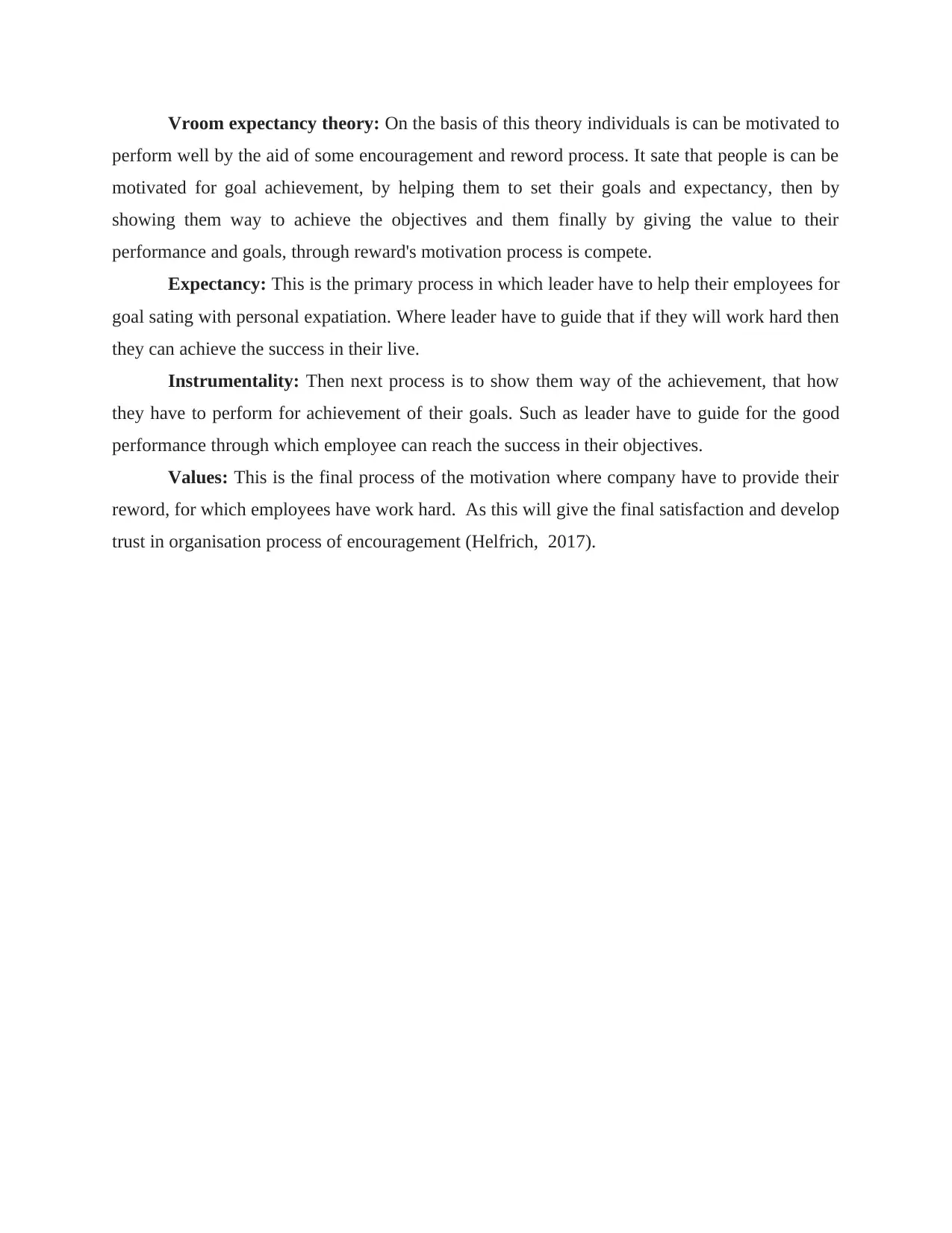
Vroom expectancy theory: On the basis of this theory individuals is can be motivated to
perform well by the aid of some encouragement and reword process. It sate that people is can be
motivated for goal achievement, by helping them to set their goals and expectancy, then by
showing them way to achieve the objectives and them finally by giving the value to their
performance and goals, through reward's motivation process is compete.
Expectancy: This is the primary process in which leader have to help their employees for
goal sating with personal expatiation. Where leader have to guide that if they will work hard then
they can achieve the success in their live.
Instrumentality: Then next process is to show them way of the achievement, that how
they have to perform for achievement of their goals. Such as leader have to guide for the good
performance through which employee can reach the success in their objectives.
Values: This is the final process of the motivation where company have to provide their
reword, for which employees have work hard. As this will give the final satisfaction and develop
trust in organisation process of encouragement (Helfrich, 2017).
perform well by the aid of some encouragement and reword process. It sate that people is can be
motivated for goal achievement, by helping them to set their goals and expectancy, then by
showing them way to achieve the objectives and them finally by giving the value to their
performance and goals, through reward's motivation process is compete.
Expectancy: This is the primary process in which leader have to help their employees for
goal sating with personal expatiation. Where leader have to guide that if they will work hard then
they can achieve the success in their live.
Instrumentality: Then next process is to show them way of the achievement, that how
they have to perform for achievement of their goals. Such as leader have to guide for the good
performance through which employee can reach the success in their objectives.
Values: This is the final process of the motivation where company have to provide their
reword, for which employees have work hard. As this will give the final satisfaction and develop
trust in organisation process of encouragement (Helfrich, 2017).
⊘ This is a preview!⊘
Do you want full access?
Subscribe today to unlock all pages.

Trusted by 1+ million students worldwide
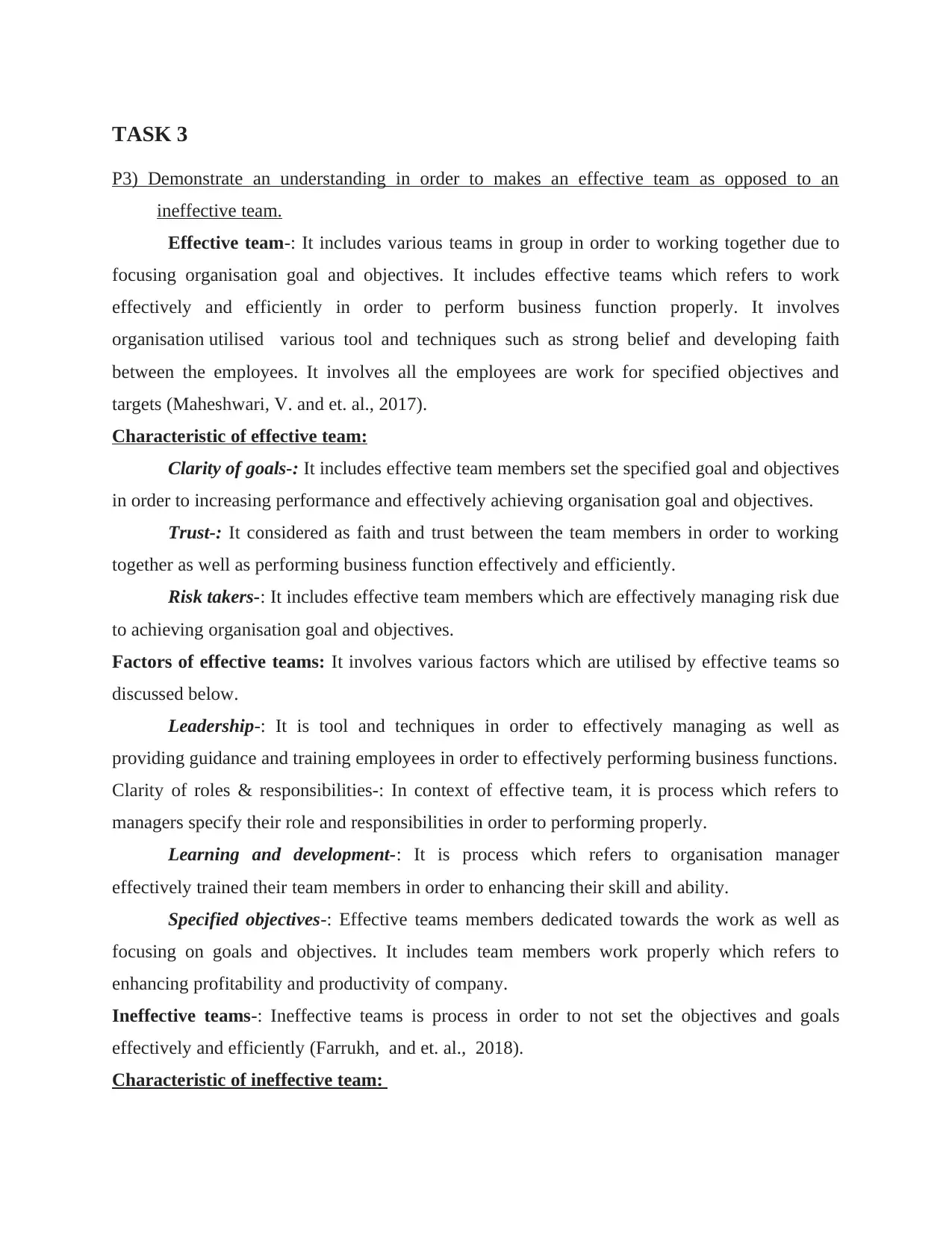
TASK 3
P3) Demonstrate an understanding in order to makes an effective team as opposed to an
ineffective team.
Effective team-: It includes various teams in group in order to working together due to
focusing organisation goal and objectives. It includes effective teams which refers to work
effectively and efficiently in order to perform business function properly. It involves
organisation utilised various tool and techniques such as strong belief and developing faith
between the employees. It involves all the employees are work for specified objectives and
targets (Maheshwari, V. and et. al., 2017).
Characteristic of effective team:
Clarity of goals-: It includes effective team members set the specified goal and objectives
in order to increasing performance and effectively achieving organisation goal and objectives.
Trust-: It considered as faith and trust between the team members in order to working
together as well as performing business function effectively and efficiently.
Risk takers-: It includes effective team members which are effectively managing risk due
to achieving organisation goal and objectives.
Factors of effective teams: It involves various factors which are utilised by effective teams so
discussed below.
Leadership-: It is tool and techniques in order to effectively managing as well as
providing guidance and training employees in order to effectively performing business functions.
Clarity of roles & responsibilities-: In context of effective team, it is process which refers to
managers specify their role and responsibilities in order to performing properly.
Learning and development-: It is process which refers to organisation manager
effectively trained their team members in order to enhancing their skill and ability.
Specified objectives-: Effective teams members dedicated towards the work as well as
focusing on goals and objectives. It includes team members work properly which refers to
enhancing profitability and productivity of company.
Ineffective teams-: Ineffective teams is process in order to not set the objectives and goals
effectively and efficiently (Farrukh, and et. al., 2018).
Characteristic of ineffective team:
P3) Demonstrate an understanding in order to makes an effective team as opposed to an
ineffective team.
Effective team-: It includes various teams in group in order to working together due to
focusing organisation goal and objectives. It includes effective teams which refers to work
effectively and efficiently in order to perform business function properly. It involves
organisation utilised various tool and techniques such as strong belief and developing faith
between the employees. It involves all the employees are work for specified objectives and
targets (Maheshwari, V. and et. al., 2017).
Characteristic of effective team:
Clarity of goals-: It includes effective team members set the specified goal and objectives
in order to increasing performance and effectively achieving organisation goal and objectives.
Trust-: It considered as faith and trust between the team members in order to working
together as well as performing business function effectively and efficiently.
Risk takers-: It includes effective team members which are effectively managing risk due
to achieving organisation goal and objectives.
Factors of effective teams: It involves various factors which are utilised by effective teams so
discussed below.
Leadership-: It is tool and techniques in order to effectively managing as well as
providing guidance and training employees in order to effectively performing business functions.
Clarity of roles & responsibilities-: In context of effective team, it is process which refers to
managers specify their role and responsibilities in order to performing properly.
Learning and development-: It is process which refers to organisation manager
effectively trained their team members in order to enhancing their skill and ability.
Specified objectives-: Effective teams members dedicated towards the work as well as
focusing on goals and objectives. It includes team members work properly which refers to
enhancing profitability and productivity of company.
Ineffective teams-: Ineffective teams is process in order to not set the objectives and goals
effectively and efficiently (Farrukh, and et. al., 2018).
Characteristic of ineffective team:
Paraphrase This Document
Need a fresh take? Get an instant paraphrase of this document with our AI Paraphraser
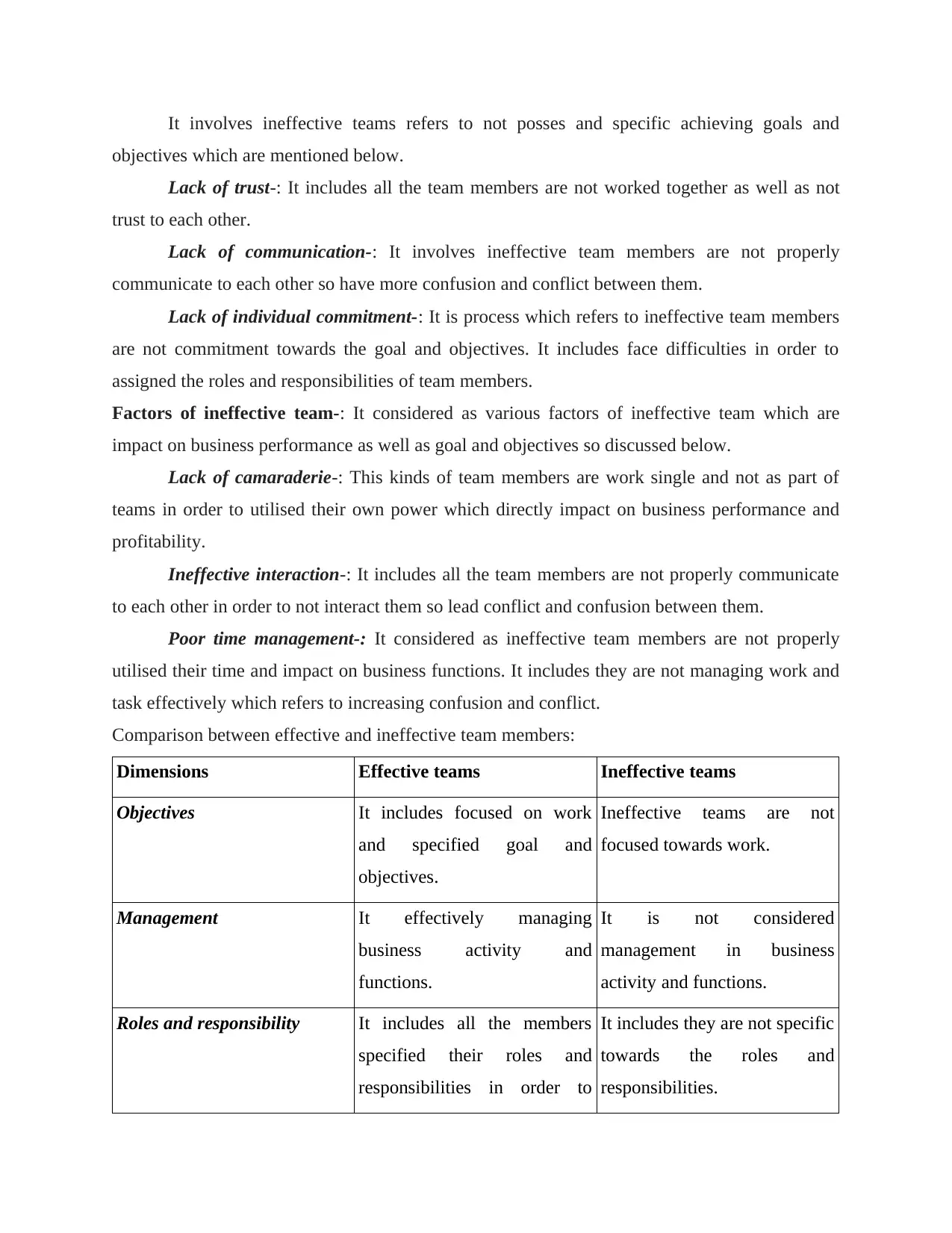
It involves ineffective teams refers to not posses and specific achieving goals and
objectives which are mentioned below.
Lack of trust-: It includes all the team members are not worked together as well as not
trust to each other.
Lack of communication-: It involves ineffective team members are not properly
communicate to each other so have more confusion and conflict between them.
Lack of individual commitment-: It is process which refers to ineffective team members
are not commitment towards the goal and objectives. It includes face difficulties in order to
assigned the roles and responsibilities of team members.
Factors of ineffective team-: It considered as various factors of ineffective team which are
impact on business performance as well as goal and objectives so discussed below.
Lack of camaraderie-: This kinds of team members are work single and not as part of
teams in order to utilised their own power which directly impact on business performance and
profitability.
Ineffective interaction-: It includes all the team members are not properly communicate
to each other in order to not interact them so lead conflict and confusion between them.
Poor time management-: It considered as ineffective team members are not properly
utilised their time and impact on business functions. It includes they are not managing work and
task effectively which refers to increasing confusion and conflict.
Comparison between effective and ineffective team members:
Dimensions Effective teams Ineffective teams
Objectives It includes focused on work
and specified goal and
objectives.
Ineffective teams are not
focused towards work.
Management It effectively managing
business activity and
functions.
It is not considered
management in business
activity and functions.
Roles and responsibility It includes all the members
specified their roles and
responsibilities in order to
It includes they are not specific
towards the roles and
responsibilities.
objectives which are mentioned below.
Lack of trust-: It includes all the team members are not worked together as well as not
trust to each other.
Lack of communication-: It involves ineffective team members are not properly
communicate to each other so have more confusion and conflict between them.
Lack of individual commitment-: It is process which refers to ineffective team members
are not commitment towards the goal and objectives. It includes face difficulties in order to
assigned the roles and responsibilities of team members.
Factors of ineffective team-: It considered as various factors of ineffective team which are
impact on business performance as well as goal and objectives so discussed below.
Lack of camaraderie-: This kinds of team members are work single and not as part of
teams in order to utilised their own power which directly impact on business performance and
profitability.
Ineffective interaction-: It includes all the team members are not properly communicate
to each other in order to not interact them so lead conflict and confusion between them.
Poor time management-: It considered as ineffective team members are not properly
utilised their time and impact on business functions. It includes they are not managing work and
task effectively which refers to increasing confusion and conflict.
Comparison between effective and ineffective team members:
Dimensions Effective teams Ineffective teams
Objectives It includes focused on work
and specified goal and
objectives.
Ineffective teams are not
focused towards work.
Management It effectively managing
business activity and
functions.
It is not considered
management in business
activity and functions.
Roles and responsibility It includes all the members
specified their roles and
responsibilities in order to
It includes they are not specific
towards the roles and
responsibilities.
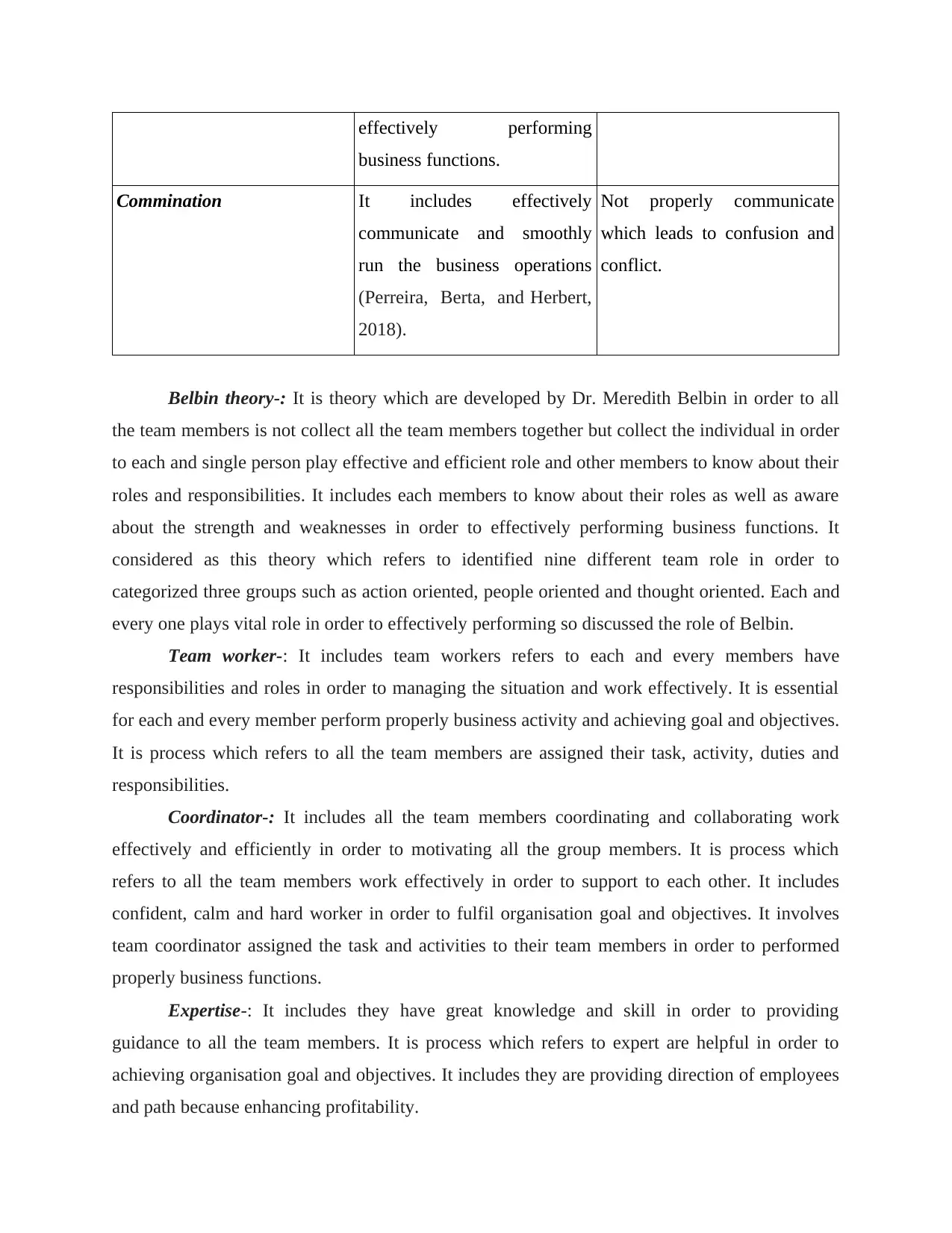
effectively performing
business functions.
Commination It includes effectively
communicate and smoothly
run the business operations
(Perreira, Berta, and Herbert,
2018).
Not properly communicate
which leads to confusion and
conflict.
Belbin theory-: It is theory which are developed by Dr. Meredith Belbin in order to all
the team members is not collect all the team members together but collect the individual in order
to each and single person play effective and efficient role and other members to know about their
roles and responsibilities. It includes each members to know about their roles as well as aware
about the strength and weaknesses in order to effectively performing business functions. It
considered as this theory which refers to identified nine different team role in order to
categorized three groups such as action oriented, people oriented and thought oriented. Each and
every one plays vital role in order to effectively performing so discussed the role of Belbin.
Team worker-: It includes team workers refers to each and every members have
responsibilities and roles in order to managing the situation and work effectively. It is essential
for each and every member perform properly business activity and achieving goal and objectives.
It is process which refers to all the team members are assigned their task, activity, duties and
responsibilities.
Coordinator-: It includes all the team members coordinating and collaborating work
effectively and efficiently in order to motivating all the group members. It is process which
refers to all the team members work effectively in order to support to each other. It includes
confident, calm and hard worker in order to fulfil organisation goal and objectives. It involves
team coordinator assigned the task and activities to their team members in order to performed
properly business functions.
Expertise-: It includes they have great knowledge and skill in order to providing
guidance to all the team members. It is process which refers to expert are helpful in order to
achieving organisation goal and objectives. It includes they are providing direction of employees
and path because enhancing profitability.
business functions.
Commination It includes effectively
communicate and smoothly
run the business operations
(Perreira, Berta, and Herbert,
2018).
Not properly communicate
which leads to confusion and
conflict.
Belbin theory-: It is theory which are developed by Dr. Meredith Belbin in order to all
the team members is not collect all the team members together but collect the individual in order
to each and single person play effective and efficient role and other members to know about their
roles and responsibilities. It includes each members to know about their roles as well as aware
about the strength and weaknesses in order to effectively performing business functions. It
considered as this theory which refers to identified nine different team role in order to
categorized three groups such as action oriented, people oriented and thought oriented. Each and
every one plays vital role in order to effectively performing so discussed the role of Belbin.
Team worker-: It includes team workers refers to each and every members have
responsibilities and roles in order to managing the situation and work effectively. It is essential
for each and every member perform properly business activity and achieving goal and objectives.
It is process which refers to all the team members are assigned their task, activity, duties and
responsibilities.
Coordinator-: It includes all the team members coordinating and collaborating work
effectively and efficiently in order to motivating all the group members. It is process which
refers to all the team members work effectively in order to support to each other. It includes
confident, calm and hard worker in order to fulfil organisation goal and objectives. It involves
team coordinator assigned the task and activities to their team members in order to performed
properly business functions.
Expertise-: It includes they have great knowledge and skill in order to providing
guidance to all the team members. It is process which refers to expert are helpful in order to
achieving organisation goal and objectives. It includes they are providing direction of employees
and path because enhancing profitability.
⊘ This is a preview!⊘
Do you want full access?
Subscribe today to unlock all pages.

Trusted by 1+ million students worldwide
1 out of 19
Related Documents
Your All-in-One AI-Powered Toolkit for Academic Success.
+13062052269
info@desklib.com
Available 24*7 on WhatsApp / Email
![[object Object]](/_next/static/media/star-bottom.7253800d.svg)
Unlock your academic potential
Copyright © 2020–2025 A2Z Services. All Rights Reserved. Developed and managed by ZUCOL.




